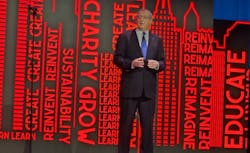Reason for Optimism: State of the CRE Industry (BOMA 2023)
Tuesday morning at the 2023 BOMA International Conference & Expo may have taken some attendees by surprise as BOMA International President and Chief Operating Officer, Henry Chamberlain, took the stage to deliver his annual state of the industry address. With talk of an economic recession making headlines, some may have expected a rather gloomy forecast from the association’s president with regard to the health of the industry.
Instead, Chamberlain pointed to the strengths he sees in CRE by offering attendees an in-depth look at the current state of the industry and provided insight into how this time of disruption and massive change has transformed and strengthened commercial real estate for the long term.
Economic Overview: There’s a Bright Side
“CRE continues to be a diverse and challenging marketplace,” Chamberlain conceded, nothing that as an industry, “we are in uncharted territory.” Nevertheless, he pointed to continued growth in major markets from North America to Asia Pacific. “With inflation down 6.5% since 2022, there’s reason to be optimistic,” he said, adding that the U.S. economy continues to add jobs as well.
Chamberlain was optimistic about 2024, suggesting “next year is going to be brighter with markets opening up, and even the office side will recover, as there’s lots of capital on the sidelines. Literally, there are billions and billions of dollars waiting for some of those offices to reprice, where the bottom is going to be, and then they’re going to swoop in and invest in it,” he said.
Also, while owners and managers may still be struggling with Class A office space vacancies, Chamberlain pointed to a recent BOMA tenant survey that revealed a 200% increase in investment in amenities—a strong signal that building owners and managers are making the necessary investments in their properties to attract and retain tenants in this challenging marketplace. Part of that process involves rethinking and reinventing spaces to allow people to come together and leverage those amenities and experiences they can’t get working from home.
“And it’s not foosball tables and ping pong tables,” Chamberlain pointed out. “It’s in creating collaborative areas, maybe putting in the coffee bar and all the rest. But it’s really trying to create flexible workplaces with amenities that bring the team together, utilizing other parts of the building such as rooftops, and taking advantage of the technology that’s available” that enable people to collaborate, he said.
Opportunities for Workforce Development
Chamberlain said the number one issue facing BOMA’s national advisory council is workforce development, because attracting and retaining talent remains a big challenge—but one that the industry is well positioned to address.
“The fact is, people are really wrestling with, how do we attract talent and build in that mentorship?” he said. However, he noted that “once you get somebody into a real estate job, property management, they say it’s a great career. It’s a fun job.”
As an organization, BOMA continues to offer training, education and scholarship programs to help recruit and develop the next generation of emerging professionals. “We’re getting younger, which is great as an organization,” he said.
Of course, BOMA is also putting a great deal of emphasis on its diversity, equity and inclusion (DEI) initiatives as well, Chamberlain noted, “so that we can reflect the communities we’re doing business with, and it’s also a reflection of the changing demographics of the country. We need to go after that talent and to attract everybody to be part of the teams that are working in our industry.”
High-Performing Buildings Create Value
BOMA has also developed a strong focus on decarbonization over the years, as evidenced by the fact that the organization is a 16-time Energy Star Partner of the Year award recipient. It’s also a strategic initiative for the association because “it’s how you create value in the marketplace,” Chamberlain said. “It’s what’s being pushed by institutional investors.”
Through a series of video case studies, attendees heard firsthand how the BOMA 360 sustainable building certification program has benefitted members who have adopted its principles. Through its certification and awards programs, BOMA members have been encouraged to reach higher and loftier sustainability goals across their building portfolios to the benefit of their businesses and the environment.
Sustainability is part of BOMA’s DNA, Chamberlain noted, because “high performance drives the bottom line, which increases asset value. It’s what we all need to be doing.”
Although challenges abound in the CRE industry, Chamberlain’s address made it clear that BOMA and its members are well-positioned to tackle them head on.

